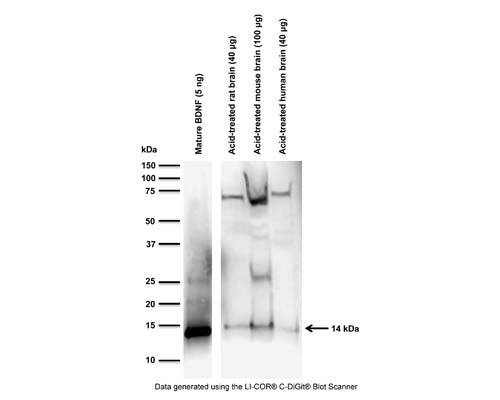Anti-Brain-derived neurotrophic factor (BDNF) Antibody (4C8)
Our Anti-Brain-derived neurotrophic factor (BDNF) mouse monoclonal primary antibody detects human, mouse, other mammals (predicted), and rat Brain-derived neurotrophic factor (BDNF), and is IgG. It is validated for use in ELISA, WB.


Western blot analysis of BDNF expression in acid-treated rodent and human brain samples. Brain samples were acid-treated at pH 4 (refer to References for a detailed extraction method protocol). M-1744-50/100 (1 µg/mL) detects BDNF monomer at 14 kDa. Additional higher MW bands are not characterized, but may be related to the cross-reaction of the secondary anti-mouse-HRP antibody with endogenous, reduced IgG present in samples, in particular mouse tissue.
Western Blotting Method: SDS-PAGE: denaturing and reducing, 12% Bis-Tris gel; Transfer: Tris-Glycine buffer, semi-dry transfer; Membrane: nitrocellulose (0.22 µm); Blocking: 5% skim milk in TBST, 1 hour at RT; Primary antibody: overnight at 4°C; Secondary antibody: anti-mouse-HRP (1/6000), 2 hours at RT; Detection: Chemiluminiscence.
Click on image to zoom
Western Blotting Method: SDS-PAGE: denaturing and reducing, 12% Bis-Tris gel; Transfer: Tris-Glycine buffer, semi-dry transfer; Membrane: nitrocellulose (0.22 µm); Blocking: 5% skim milk in TBST, 1 hour at RT; Primary antibody: overnight at 4°C; Secondary antibody: anti-mouse-HRP (1/6000), 2 hours at RT; Detection: Chemiluminiscence.
SKU: M-1744-100
Product Details
Brain-derived neurotrophic factor (BDNF)
BDNF belongs to the neurotrophin family and promotes the survival of neuronal populations that are all located either in the central nervous system or directly connected to it. It is a major regulator of synaptic transmission and plasticity at adult synapses in many regions of the CNS. The versatility of BDNF is emphasized by its contribution to a range of adaptive neuronal responses including long-term potentiation (LTP), long-term depression (LTD), certain forms of short-term synaptic plasticity, as well as homeostatic regulation of intrinsic neuronal excitability. The alterations in BDNF expression induced by various kinds of brain insult including stress, ischemia, seizure activity and hypoglycemia, may contribute to some pathologies such as depression, epilepsy, Alzheimer's, and Parkinson's disease. Microglia release BDNF that may contribute to neuroinflammation and neuropathic pain. SUBUNIT: Monomers and homodimers. Binds to NTRK2/TRKB. SUBCELLULAR LOCATION: Secreted protein. POst translation modification: Converted into mature BDNF by plasmin (PLG). SIMILARITY: Belongs to the NGF-beta family.
IgG
Monoclonal
4C8
IgG
ELISA, WB
Mouse
14 kDa (see application notes)
Recombinant human mature BDNF expressed in E.coli
Human
Human, Mouse, Rat
Spin vial briefly before opening. Reconstitute each vial with 50 µL sterile-filtered, ultrapure water to obtain a concentration of 1 mg/mL. Centrifuge to remove any insoluble material. Store lyophilized antibody at -20°C to -80°C protected from moisture. After reconstitution divide antibody into useful aliquots and keep aliquots at -20°C to -80°C for a higher stability. Working aliquots can be kept at 2-8°C for up to 1 month. Avoid repetitive freeze/thaw cycles.
Lyophilized
Protein G purified mouse IgG.
Lyophilized from a solution containing PBS pH 7.4, 0.1% trehalose, with 0.1% sodium azide.
WB: 0.2-2 µg/mL
IHC: 1-4 µg/mL
ICC: 1-4 µg/mL
ELISA: 50-100 ng/mL
IHC: 1-4 µg/mL
ICC: 1-4 µg/mL
ELISA: 50-100 ng/mL
M-1744-100 antibody detects 14 kDa mature BDNF monomer in human serum human and acid treated human and rodent whole tissue homogenates. In simple Tris-homogenate human brain lysates, M-1744-100 detects mature BDNF at 14 kDa as well as an uncharacterized band at ~50 kDa. No proBDNF band is detected in our samples, although M-1744-100 will detect proBDNF in purified form on blots. Additionally, M-1744-100 detects an additional band 18 kDa BDNF isoform human serum. For cell lysates, some caution is advised as in our hands M-1744-100 fails to detect mature BDNF on SH-SY5Y or C6 cell lysates but does detect mature BDNF in neuronal cell culture lysates. The reason for these differences has not been characterized. For detection of mature BDNF in cell lysates such as SH-SY5Y we recommend affinity-purified rabbit polyclonal antibody to rhBDNF (R-1707-100), or rabbit polyclonal antibody to BDNF peptide 1-10 (R-083-100, whole serum; R-066-500, IgG).
IF: 4% formaldehyde fixation and permeabilization. Staining can be weak until optimized.
M-1744-100 is not recommended for Flow Cytometry at this time.
IF: 4% formaldehyde fixation and permeabilization. Staining can be weak until optimized.
M-1744-100 is not recommended for Flow Cytometry at this time.
Unconjugated
Detects human, mouse, rat, guinea pig BDNF. Expected to detect BDNF from other species due to sequence homology.
For research use only.
United States
12 months after date of receipt (unopened vial).
Brain-derived neurotrophic factor; Abrineurin; proBDNF
25°C (ambient)


